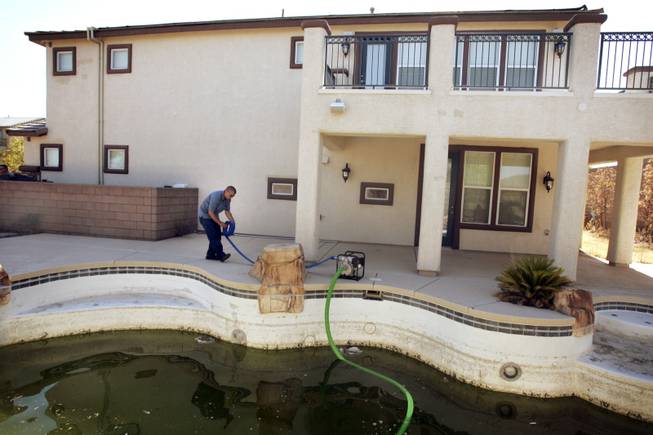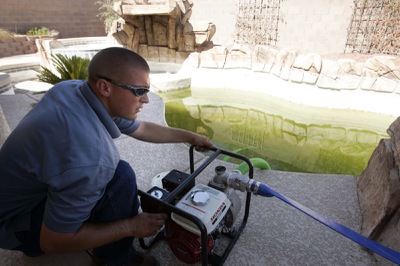
Steve Thompson of Blue Wave Pool Service drains a pool at a foreclosed home in Henderson. Mosquitoes can be a problem at such pools.
Friday, July 23, 2010 | 3 a.m.
Local governments in Southern Nevada are cracking down on owners of vacant homes and are encouraging banks to foreclose on homes more quickly before they fall into disrepair.
Some recent moves have upset investors, who fear they will have to pay more to acquire homes through the foreclosure process or that the homes will remain on the market because of prohibitive liens.
Clark County adopted a code in June that requires owners to submit a plan for rehabbing their properties or face a $1,000-a-day penalty, said Joe Boteilho, the county’s chief code enforcement officer. The county has the authority to place a lien on the property if the penalties aren’t paid, he said.
North Las Vegas is considering increasing fees to cover the staff expense of dealing with code violations. Henderson is looking at an ordinance or state legislation to get banks to take possession of foreclosure properties more quickly.
Clark County’s action was needed because many homes are sitting vacant, and people aren’t taking responsibility for the properties, Boteilho said. In 2009, about 1,000 homes were cited for such problems, he said.
The owners have moved out because they were evicted by banks for not making payments, but the properties are still in their names because lenders have yet to foreclose, Boteilho said.
That leaves the properties in limbo.
Some homes have broken windows, unsecured doors, landscaping that’s not maintained and unkempt pools that can become a breeding ground for mosquitoes, he said. Some homes even have squatters, he added.
“We are doing something by doing something,” Boteilho said. “We have gotten the word out that Clark County is not going to tolerate this. People shouldn’t have to deal with their property values going down because owners aren’t maintaining their properties.”
Bill Uffelman, president of the Nevada Bankers Association, said he is concerned about the new code. He suggested it could “destroy the reasonableness” of the foreclosure process by imposing a $1,000-a-day fine and then strictly enforcing it.
“The reality is they are walking a fine line, and if they get too aggressive, they could destroy the reasonableness (of) foreclosures,” Uffelman said.
Financial institutions don’t own the property until the foreclosure sale, and their interests should be protected, he said. Once the lender is the owner, it will do what it can to comply.
If the fines and fees are imposed on the defaulted borrower, that will make the problem worse and areas more blighted and decrease property values, he said.
“If these fines accumulate, is anybody going to buy it?” Uffelman said. “The county could end up owning it. The real question is ‘who are you fingering?’ If the defaulting borrower is not paying their mortgage or homeowners association fees, they could care less if the county throws more fees on them.”
Boteilho said the intent is not to blame the banks, but simply to hold the owners responsible, whoever they may be. It’s about taking care of the property. In addition to the new penalty for not filing a plan, the county has one code that charges a $10,000 maximum civil penalty and another that allows charges of three times the cost to abate the problem.
“It is not a moneymaking venture,” Boteilho said. “The board looks at it on a case-by-case basis to waive or reduce those fees. It costs a lot less to take care of the property than pay a $1,000 fine for one day.”
The aggressive provisions in the county code, however, aren’t being pursued by any Southern Nevada cities.
“We are looking at changes that aren’t to make money or collect liens, but get compliance,” said Alan Ellis, Henderson’s inspection services manager. “I think what (Clark County) is doing is going to have a negative impact and is more about revenue generation. When you start liening houses, it discourages people from buying houses.”
Henderson issues a $100 citation for the first violations and gives property owners 14 days to address the problem. If it isn’t addressed, the owner faces a $250 citation and if the problem is not corrected in another two weeks, it goes to $500. The city will pursue a criminal citation against the owner in the next step, Ellis said.
If the property needs cleaning up, the city will do it and absorb the cost and doesn’t place liens on the property because they could take years to collect and the city doesn’t want to accentuate the problem and prevent the properties from being sold, Ellis said.
Banks’ unwillingness to foreclose and take possession of the property after they evict the owners are the problems, Ellis said. It appears to be a strategy to avoid taking responsibility for properties to maintain them and pay homeowners association fees and save themselves money, he said.
“There is nothing we can do, but we try to work with the banks,” Ellis said. “Usually what they do when they have a buyer for a property, they will transfer ownership (to the banks) a couple of weeks right before the sale. That makes it a big problem for us.”
Henderson is looking to work with the state Legislature in the 2011 session to require banks to take possession of homes 30 to 60 days after they are vacated.
It is looking at what it could implement on its own without the need of any legislation, including a foreclosure registration system to track properties.
Tom Goyda, vice president of government relations for Wells Fargo Home Mortgage, said legal issues over when banks can or can’t take possession of homes exist. But he added Wells Fargo has a team that identifies vacant homes and maintains them.
“I can’t speak to what others do,” Goyda said. “There are a lot of other servicers out there.”
In North Las Vegas, the maximum fine is $1,137 per violation, and the city retains the ability to place liens for the cost of abating a problem. The city is eyeing charges to recover its costs for the code enforcement process.
“The entire Las Vegas Valley has been hit so hard with the economic downturn that scores of homes have been in default or foreclosure,” said Kevin Brame, deputy fire chief. “It is a fairly big problem, and if you are living next to a home in default and people walk away, it sits there for months and all the vegetation dies and trash collects and falls into deterioration.”
Las Vegas charges $120 to $500 a day in penalties, and it has the ability to place liens on the property. It hasn’t announced any plans to change its codes.
Henderson has 4,000 homes in the foreclosure process and the majority are vacant, Ellis said. Of the problems identified, 90 percent end up complying but it’s the other 10 percent that must be dealt with, Ellis said. In 2009, the city had to deal with 61 swimming pools.
“We are spending a lot of time and resources to maintain properties that the bank should be maintaining, but unfortunately we have to work with the legal owners of the property,” Ellis said.



Join the Discussion:
Check this out for a full explanation of our conversion to the LiveFyre commenting system and instructions on how to sign up for an account.
Full comments policy